Analyzing My Health Record: Benefits, Challenges, and Its Capabilities
VerifiedAdded on 2021/04/20
|5
|1195
|79
Report
AI Summary
This report examines My Health Record (MHR), exploring its capabilities, benefits, and challenges. The MHR system offers numerous advantages, including electronic storage and sharing of patient data, e-medication, and eHRP programs. However, it also faces challenges such as high implementation costs, the need for data conversion, and patient concerns about data privacy. The report highlights the potential of MHR to improve patient care through efficient data access, reduced costs, and enhanced communication between healthcare providers and patients. It also discusses the importance of data security measures to protect patient information. The report concludes by emphasizing the value of MHR as a life-saving technology.
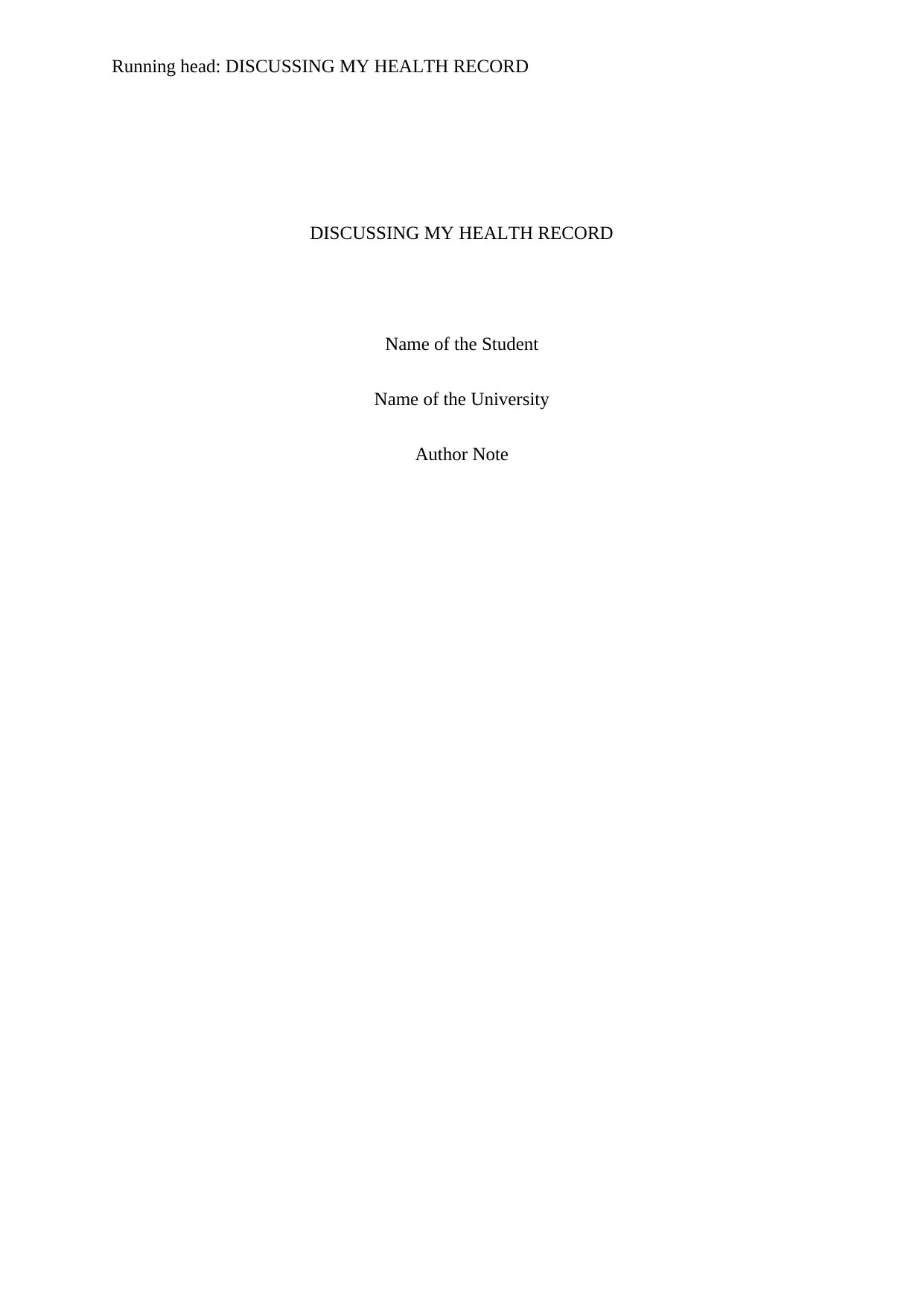
Running head: DISCUSSING MY HEALTH RECORD
DISCUSSING MY HEALTH RECORD
Name of the Student
Name of the University
Author Note
DISCUSSING MY HEALTH RECORD
Name of the Student
Name of the University
Author Note
Paraphrase This Document
Need a fresh take? Get an instant paraphrase of this document with our AI Paraphraser
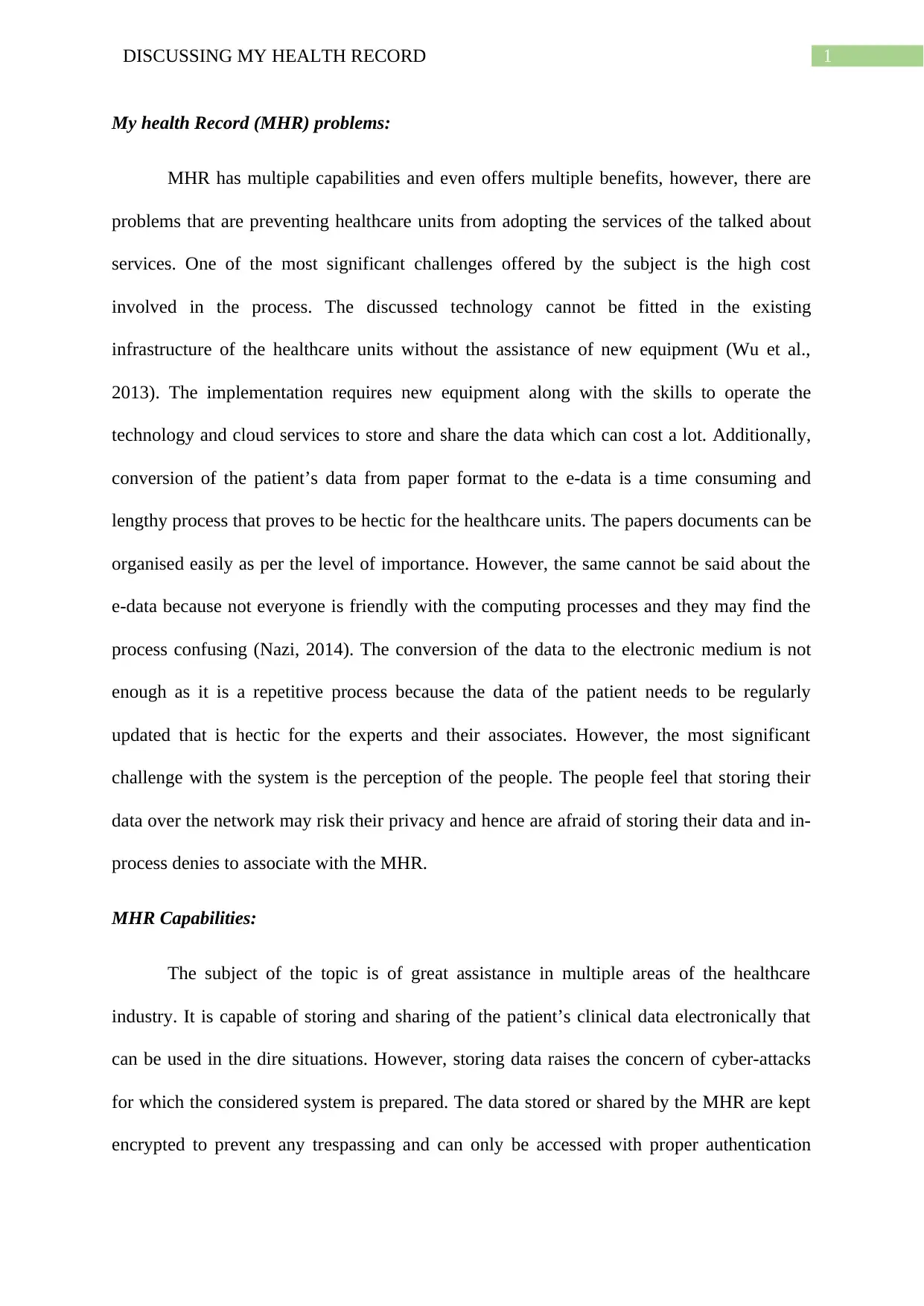
1DISCUSSING MY HEALTH RECORD
My health Record (MHR) problems:
MHR has multiple capabilities and even offers multiple benefits, however, there are
problems that are preventing healthcare units from adopting the services of the talked about
services. One of the most significant challenges offered by the subject is the high cost
involved in the process. The discussed technology cannot be fitted in the existing
infrastructure of the healthcare units without the assistance of new equipment (Wu et al.,
2013). The implementation requires new equipment along with the skills to operate the
technology and cloud services to store and share the data which can cost a lot. Additionally,
conversion of the patient’s data from paper format to the e-data is a time consuming and
lengthy process that proves to be hectic for the healthcare units. The papers documents can be
organised easily as per the level of importance. However, the same cannot be said about the
e-data because not everyone is friendly with the computing processes and they may find the
process confusing (Nazi, 2014). The conversion of the data to the electronic medium is not
enough as it is a repetitive process because the data of the patient needs to be regularly
updated that is hectic for the experts and their associates. However, the most significant
challenge with the system is the perception of the people. The people feel that storing their
data over the network may risk their privacy and hence are afraid of storing their data and in-
process denies to associate with the MHR.
MHR Capabilities:
The subject of the topic is of great assistance in multiple areas of the healthcare
industry. It is capable of storing and sharing of the patient’s clinical data electronically that
can be used in the dire situations. However, storing data raises the concern of cyber-attacks
for which the considered system is prepared. The data stored or shared by the MHR are kept
encrypted to prevent any trespassing and can only be accessed with proper authentication
My health Record (MHR) problems:
MHR has multiple capabilities and even offers multiple benefits, however, there are
problems that are preventing healthcare units from adopting the services of the talked about
services. One of the most significant challenges offered by the subject is the high cost
involved in the process. The discussed technology cannot be fitted in the existing
infrastructure of the healthcare units without the assistance of new equipment (Wu et al.,
2013). The implementation requires new equipment along with the skills to operate the
technology and cloud services to store and share the data which can cost a lot. Additionally,
conversion of the patient’s data from paper format to the e-data is a time consuming and
lengthy process that proves to be hectic for the healthcare units. The papers documents can be
organised easily as per the level of importance. However, the same cannot be said about the
e-data because not everyone is friendly with the computing processes and they may find the
process confusing (Nazi, 2014). The conversion of the data to the electronic medium is not
enough as it is a repetitive process because the data of the patient needs to be regularly
updated that is hectic for the experts and their associates. However, the most significant
challenge with the system is the perception of the people. The people feel that storing their
data over the network may risk their privacy and hence are afraid of storing their data and in-
process denies to associate with the MHR.
MHR Capabilities:
The subject of the topic is of great assistance in multiple areas of the healthcare
industry. It is capable of storing and sharing of the patient’s clinical data electronically that
can be used in the dire situations. However, storing data raises the concern of cyber-attacks
for which the considered system is prepared. The data stored or shared by the MHR are kept
encrypted to prevent any trespassing and can only be accessed with proper authentication
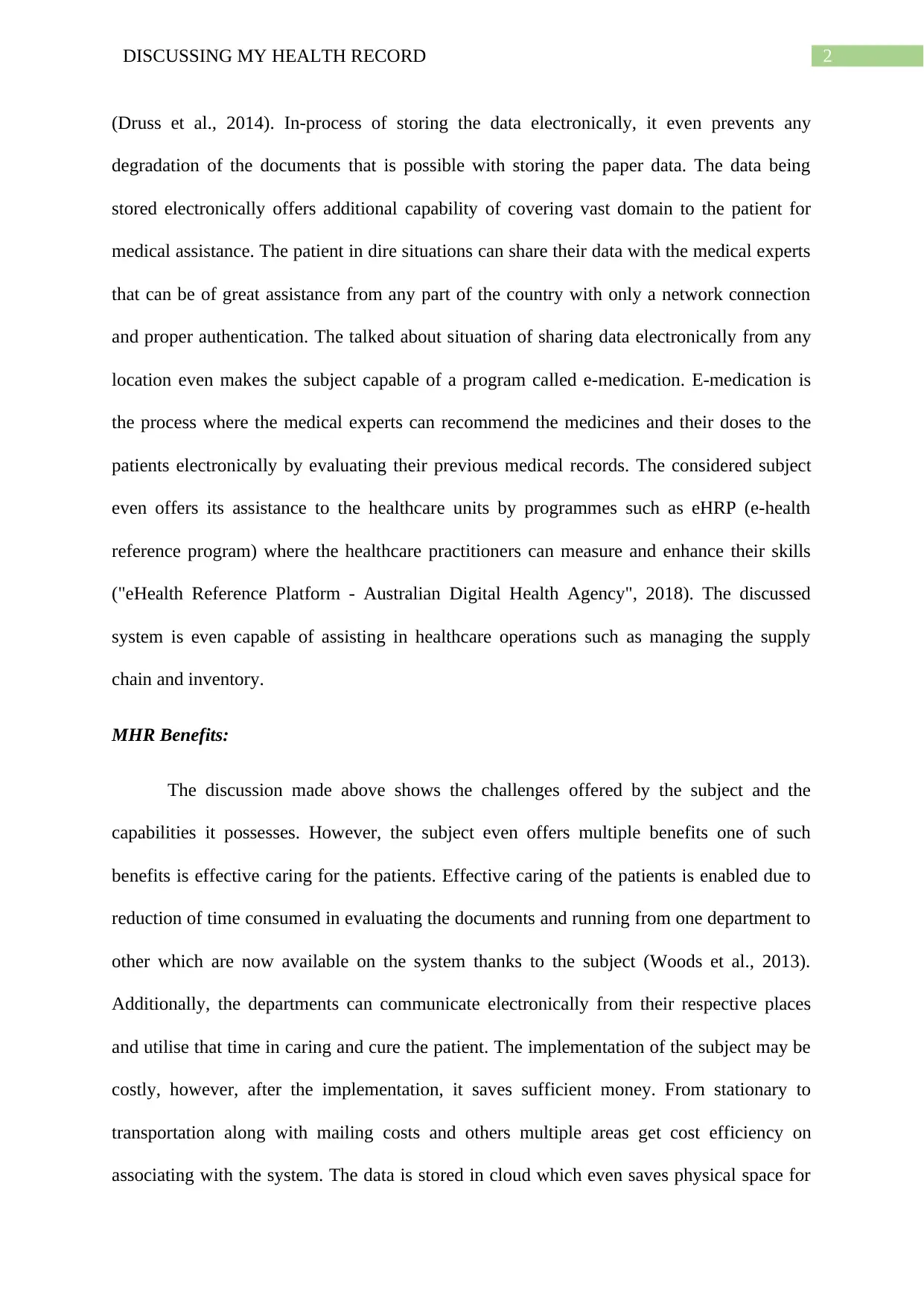
2DISCUSSING MY HEALTH RECORD
(Druss et al., 2014). In-process of storing the data electronically, it even prevents any
degradation of the documents that is possible with storing the paper data. The data being
stored electronically offers additional capability of covering vast domain to the patient for
medical assistance. The patient in dire situations can share their data with the medical experts
that can be of great assistance from any part of the country with only a network connection
and proper authentication. The talked about situation of sharing data electronically from any
location even makes the subject capable of a program called e-medication. E-medication is
the process where the medical experts can recommend the medicines and their doses to the
patients electronically by evaluating their previous medical records. The considered subject
even offers its assistance to the healthcare units by programmes such as eHRP (e-health
reference program) where the healthcare practitioners can measure and enhance their skills
("eHealth Reference Platform - Australian Digital Health Agency", 2018). The discussed
system is even capable of assisting in healthcare operations such as managing the supply
chain and inventory.
MHR Benefits:
The discussion made above shows the challenges offered by the subject and the
capabilities it possesses. However, the subject even offers multiple benefits one of such
benefits is effective caring for the patients. Effective caring of the patients is enabled due to
reduction of time consumed in evaluating the documents and running from one department to
other which are now available on the system thanks to the subject (Woods et al., 2013).
Additionally, the departments can communicate electronically from their respective places
and utilise that time in caring and cure the patient. The implementation of the subject may be
costly, however, after the implementation, it saves sufficient money. From stationary to
transportation along with mailing costs and others multiple areas get cost efficiency on
associating with the system. The data is stored in cloud which even saves physical space for
(Druss et al., 2014). In-process of storing the data electronically, it even prevents any
degradation of the documents that is possible with storing the paper data. The data being
stored electronically offers additional capability of covering vast domain to the patient for
medical assistance. The patient in dire situations can share their data with the medical experts
that can be of great assistance from any part of the country with only a network connection
and proper authentication. The talked about situation of sharing data electronically from any
location even makes the subject capable of a program called e-medication. E-medication is
the process where the medical experts can recommend the medicines and their doses to the
patients electronically by evaluating their previous medical records. The considered subject
even offers its assistance to the healthcare units by programmes such as eHRP (e-health
reference program) where the healthcare practitioners can measure and enhance their skills
("eHealth Reference Platform - Australian Digital Health Agency", 2018). The discussed
system is even capable of assisting in healthcare operations such as managing the supply
chain and inventory.
MHR Benefits:
The discussion made above shows the challenges offered by the subject and the
capabilities it possesses. However, the subject even offers multiple benefits one of such
benefits is effective caring for the patients. Effective caring of the patients is enabled due to
reduction of time consumed in evaluating the documents and running from one department to
other which are now available on the system thanks to the subject (Woods et al., 2013).
Additionally, the departments can communicate electronically from their respective places
and utilise that time in caring and cure the patient. The implementation of the subject may be
costly, however, after the implementation, it saves sufficient money. From stationary to
transportation along with mailing costs and others multiple areas get cost efficiency on
associating with the system. The data is stored in cloud which even saves physical space for
⊘ This is a preview!⊘
Do you want full access?
Subscribe today to unlock all pages.

Trusted by 1+ million students worldwide
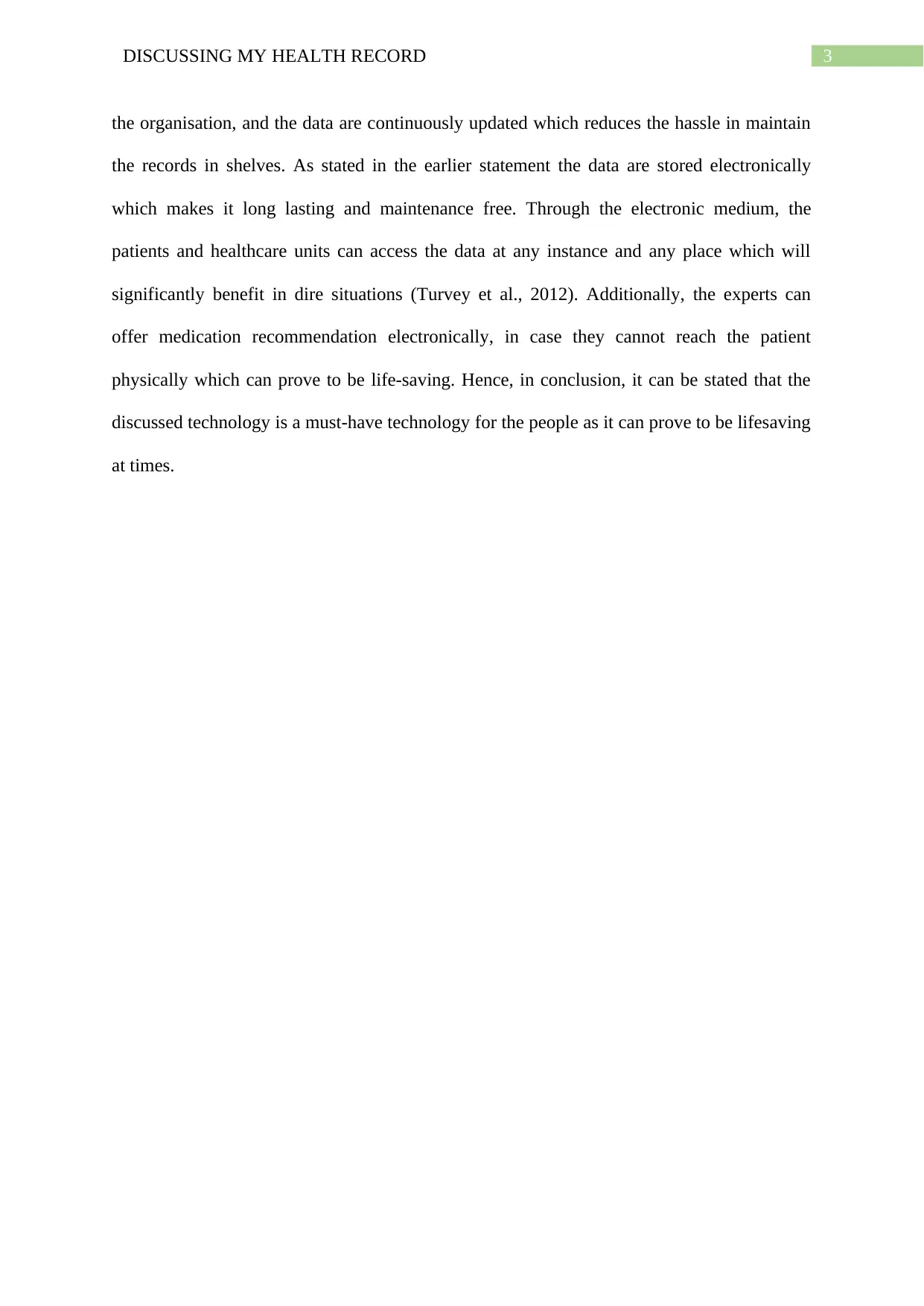
3DISCUSSING MY HEALTH RECORD
the organisation, and the data are continuously updated which reduces the hassle in maintain
the records in shelves. As stated in the earlier statement the data are stored electronically
which makes it long lasting and maintenance free. Through the electronic medium, the
patients and healthcare units can access the data at any instance and any place which will
significantly benefit in dire situations (Turvey et al., 2012). Additionally, the experts can
offer medication recommendation electronically, in case they cannot reach the patient
physically which can prove to be life-saving. Hence, in conclusion, it can be stated that the
discussed technology is a must-have technology for the people as it can prove to be lifesaving
at times.
the organisation, and the data are continuously updated which reduces the hassle in maintain
the records in shelves. As stated in the earlier statement the data are stored electronically
which makes it long lasting and maintenance free. Through the electronic medium, the
patients and healthcare units can access the data at any instance and any place which will
significantly benefit in dire situations (Turvey et al., 2012). Additionally, the experts can
offer medication recommendation electronically, in case they cannot reach the patient
physically which can prove to be life-saving. Hence, in conclusion, it can be stated that the
discussed technology is a must-have technology for the people as it can prove to be lifesaving
at times.
Paraphrase This Document
Need a fresh take? Get an instant paraphrase of this document with our AI Paraphraser
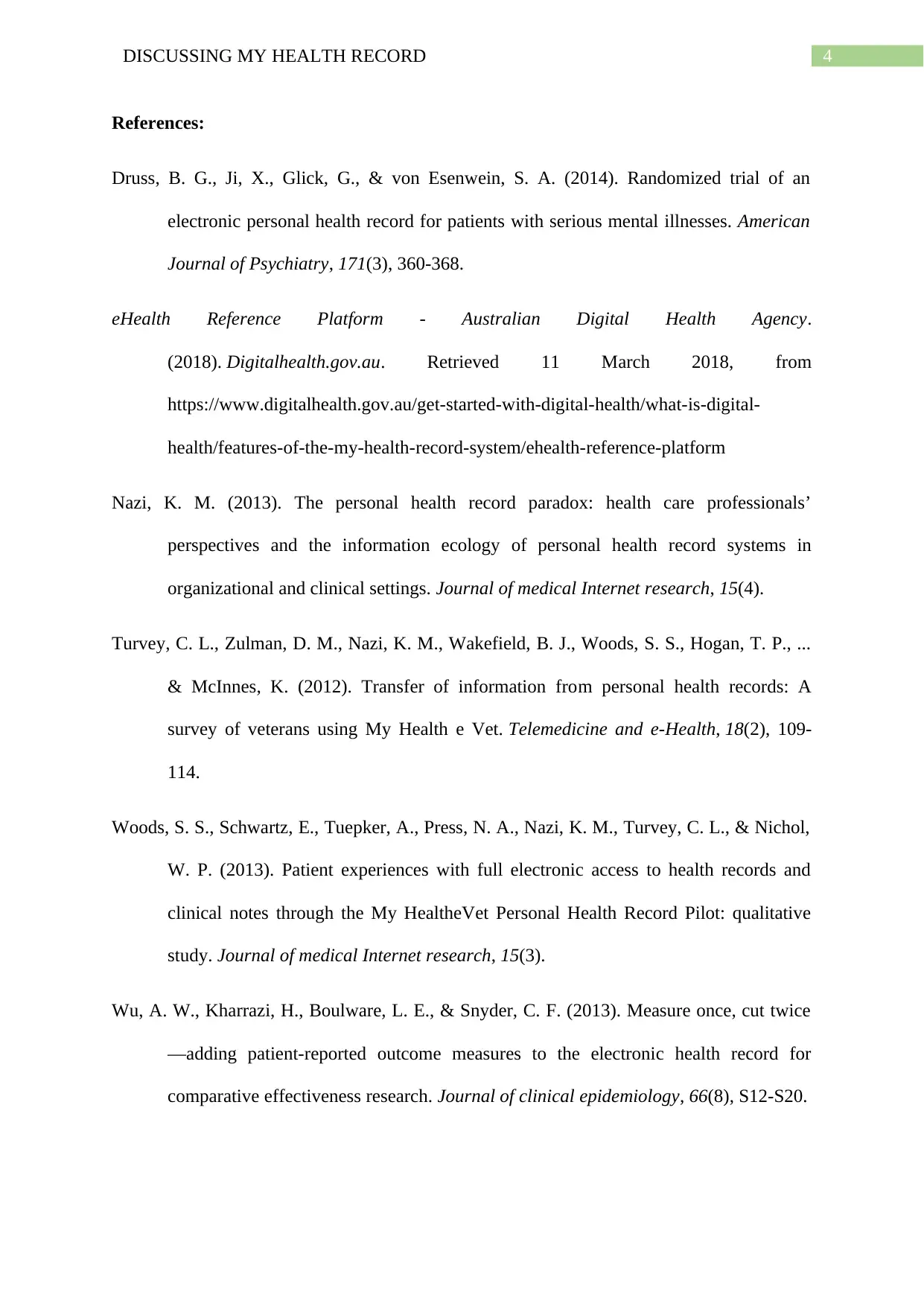
4DISCUSSING MY HEALTH RECORD
References:
Druss, B. G., Ji, X., Glick, G., & von Esenwein, S. A. (2014). Randomized trial of an
electronic personal health record for patients with serious mental illnesses. American
Journal of Psychiatry, 171(3), 360-368.
eHealth Reference Platform - Australian Digital Health Agency.
(2018). Digitalhealth.gov.au. Retrieved 11 March 2018, from
https://www.digitalhealth.gov.au/get-started-with-digital-health/what-is-digital-
health/features-of-the-my-health-record-system/ehealth-reference-platform
Nazi, K. M. (2013). The personal health record paradox: health care professionals’
perspectives and the information ecology of personal health record systems in
organizational and clinical settings. Journal of medical Internet research, 15(4).
Turvey, C. L., Zulman, D. M., Nazi, K. M., Wakefield, B. J., Woods, S. S., Hogan, T. P., ...
& McInnes, K. (2012). Transfer of information from personal health records: A
survey of veterans using My Health e Vet. Telemedicine and e-Health, 18(2), 109-
114.
Woods, S. S., Schwartz, E., Tuepker, A., Press, N. A., Nazi, K. M., Turvey, C. L., & Nichol,
W. P. (2013). Patient experiences with full electronic access to health records and
clinical notes through the My HealtheVet Personal Health Record Pilot: qualitative
study. Journal of medical Internet research, 15(3).
Wu, A. W., Kharrazi, H., Boulware, L. E., & Snyder, C. F. (2013). Measure once, cut twice
—adding patient-reported outcome measures to the electronic health record for
comparative effectiveness research. Journal of clinical epidemiology, 66(8), S12-S20.
References:
Druss, B. G., Ji, X., Glick, G., & von Esenwein, S. A. (2014). Randomized trial of an
electronic personal health record for patients with serious mental illnesses. American
Journal of Psychiatry, 171(3), 360-368.
eHealth Reference Platform - Australian Digital Health Agency.
(2018). Digitalhealth.gov.au. Retrieved 11 March 2018, from
https://www.digitalhealth.gov.au/get-started-with-digital-health/what-is-digital-
health/features-of-the-my-health-record-system/ehealth-reference-platform
Nazi, K. M. (2013). The personal health record paradox: health care professionals’
perspectives and the information ecology of personal health record systems in
organizational and clinical settings. Journal of medical Internet research, 15(4).
Turvey, C. L., Zulman, D. M., Nazi, K. M., Wakefield, B. J., Woods, S. S., Hogan, T. P., ...
& McInnes, K. (2012). Transfer of information from personal health records: A
survey of veterans using My Health e Vet. Telemedicine and e-Health, 18(2), 109-
114.
Woods, S. S., Schwartz, E., Tuepker, A., Press, N. A., Nazi, K. M., Turvey, C. L., & Nichol,
W. P. (2013). Patient experiences with full electronic access to health records and
clinical notes through the My HealtheVet Personal Health Record Pilot: qualitative
study. Journal of medical Internet research, 15(3).
Wu, A. W., Kharrazi, H., Boulware, L. E., & Snyder, C. F. (2013). Measure once, cut twice
—adding patient-reported outcome measures to the electronic health record for
comparative effectiveness research. Journal of clinical epidemiology, 66(8), S12-S20.
1 out of 5
Related Documents
Your All-in-One AI-Powered Toolkit for Academic Success.
+13062052269
info@desklib.com
Available 24*7 on WhatsApp / Email
![[object Object]](/_next/static/media/star-bottom.7253800d.svg)
Unlock your academic potential
Copyright © 2020–2026 A2Z Services. All Rights Reserved. Developed and managed by ZUCOL.




